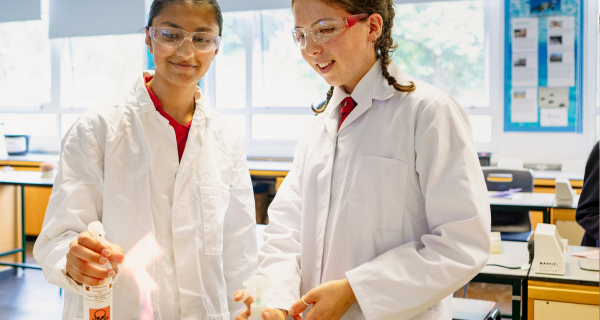In an effort to bridge the gender gap in science, technology, engineering, and mathematics (STEM), The Mary Erskine School (MES) has launched a series of initiatives aimed at making STEM subjects more accessible and appealing to female students. Understanding the critical role gender equity plays in fostering innovation and diversity within these fields, MES is committed to cultivating an environment where girls can develop a keen interest and confidence in STEM from a young age, providing opportunities for exploration and hands-on learning.
As part of their commitment to hands-on learning, the Chemistry department host the MES Science Club, which welcomes students from all year groups. Here, girls have the freedom to select their own topics to explore, whether it's delving into the art of bread-making, crafting lipstick, or even designing a gaming controller. A further part of this commitment is the establishment of STEM clubs for Primary 6 and Primary 7 students at ESMS Junior School. These clubs, guided by senior students from S5 and S6 at MES, provide a nurturing space for young girls to engage with STEM through various activities, experiments, and projects. In addition, this year, for the first time, MES will also be putting a team forward to the F1 in Schools’ competition. The competition entails the whole process of building a model racing car from scratch, from development to testing and production. This hands-on approach not only fosters curiosity but also sparks a lifelong passion for these disciplines.
The gender disparity in STEM careers has long been a concern, with women significantly underrepresented. MES's proactive approach in encouraging young girls to explore education in this area aims to narrow this gap, paving the way for a more inclusive and diverse professional landscape. Empowerment through education is key, as it provides female students with the necessary skills, confidence, and knowledge to thrive in STEM careers and beyond.
Fiona Neave, Head of Chemistry at MES said:
“STEM fields offer a wide array of exciting career opportunities, from computer science and engineering to healthcare and environmental science. By embracing STEM education, girls at MES are unlocking doors to careers that not only promise personal fulfilment but also the potential to contribute positively to society. Furthermore, STEM education is crucial for developing problem-solving abilities, critical thinking, and innovation—skills that are invaluable irrespective of the career path chosen.”
Mentorship and representation also play a crucial part in MES’ strategy in inspiring young girls to pursue STEM careers. Through the school's alumni network, former pupils share their experiences and insights into university life and STEM professions, serving as tangible proof that success in these fields is attainable for women. This initiative underscores the importance of role models and support systems in breaking down gender barriers in STEM.
Combatting stereotypes and biases is another focus area for MES, with teachers like Fiona, leading the charge. By challenging outdated notions that these subjects are "too difficult" or "male-dominated," and integrating stories of prominent women in STEM into the curriculum, MES is normalizing female participation in these fields. The school also organizes annual events such as Science and Engineering careers lunches to expose students to a variety of career paths within this area.
All of this work helped MES be awarded with Leadership in STEM and Employability and STEM partnership working, as part of the STEM Nation Award, with the department working towards three more categories of the award this year. Through its comprehensive approach, MES is not just addressing the immediate barriers faced by women and girls in STEM, but is laying the foundation for a future where gender is no longer a barrier to success in these fields.






